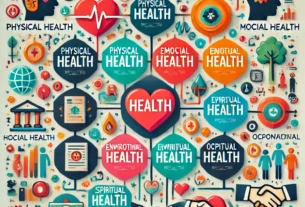Health is often seen as the cornerstone of a fulfilling and successful life. Without good health, other pursuits—career ambitions, social connections, personal growth—become secondary or even impossible to achieve. Health affects every aspect of our lives, from our ability to work and interact socially to our mental well-being and overall quality of life. In this article, we’ll dive into why health is so important and how it influences our daily lives, happiness, productivity, and longevity.
1. Health Enables Productivity and Success
Good health is essential for maintaining the energy and focus needed for daily activities, whether at work, school, or home. Physical well-being directly affects cognitive function, allowing us to think more clearly, solve problems more efficiently, and remain engaged in tasks. A healthy body supports a healthy mind, helping individuals to stay productive, creative, and motivated.
Conversely, poor health can drain energy, lower productivity, and even lead to missed opportunities. For example, chronic health conditions like fatigue, joint pain, or respiratory issues can make even simple tasks challenging, impacting professional performance, career advancement, and personal goals. By taking steps to maintain good health, we equip ourselves with the physical and mental resilience necessary for success in all areas of life.
2. Health Promotes Emotional and Mental Well-being
Physical and mental health are deeply interconnected, and both are vital for overall happiness and stability. A healthy lifestyle, including regular exercise, balanced nutrition, and adequate sleep, positively affects mood, reduces stress, and can even help alleviate symptoms of anxiety and depression. Physical activity, for example, releases endorphins—known as the body’s natural “feel-good” chemicals—which improve mood and create a sense of well-being.
In contrast, poor physical health can lead to increased stress, anxiety, and a negative outlook. Conditions such as chronic pain or long-term illness can place a heavy psychological burden on individuals, leading to feelings of frustration, sadness, or even isolation. Maintaining good health allows for a positive mindset, which is essential for emotional resilience and a fulfilling life.
3. Health Increases Longevity and Quality of Life
A healthy lifestyle has a direct impact on life expectancy and quality of life. Regular exercise, a nutritious diet, and preventive health care contribute to better physical function, reduced risk of chronic diseases, and overall longevity. Studies show that healthy habits reduce the likelihood of developing conditions like heart disease, diabetes, and obesity, all of which can diminish life quality and expectancy.
Furthermore, staying healthy allows people to enjoy a higher quality of life as they age. Instead of dealing with debilitating illnesses, a person in good health can continue to enjoy activities they love, maintain independence, and avoid the limitations that poor health often brings. Good health enables people to participate fully in life, from travel and hobbies to relationships and social events, even as they grow older.
4. Health Builds Stronger Relationships
Good health fosters positive relationships by allowing us to be active, engaged, and present in our interactions. When we feel physically and mentally well, we’re more likely to connect with others, engage in social activities, and nurture meaningful relationships. A healthy lifestyle can also set a positive example for loved ones, inspiring family and friends to adopt healthier habits as well.
Poor health, however, can create physical and emotional barriers that impact relationships. Chronic illness or mental health struggles can lead to isolation, limiting opportunities for social engagement and affecting relationships with friends, family, and colleagues. Good health, therefore, not only benefits individuals but also enriches the lives of those around them.
5. Health Supports Financial Stability
Investing in health can prevent costly medical bills and help individuals maintain a steady income. Chronic illnesses, surgeries, and medical treatments can be expensive, especially without preventive measures in place. Healthier individuals are also less likely to miss work due to sickness, leading to a more stable income and fewer financial burdens related to healthcare.
By focusing on preventive health practices, people can potentially save money on long-term healthcare costs. Regular exercise, nutritious eating, and preventive medical checkups may seem like simple habits, but they help reduce the risk of costly health issues down the road. This financial stability not only benefits individuals but also supports families and communities, as healthier people are less reliant on healthcare systems and more capable of contributing to society.
6. Health Cultivates Resilience and Adaptability
Good health helps individuals adapt to life’s challenges and changes more effectively. Physical fitness, for example, builds strength, endurance, and flexibility, allowing people to respond to physical demands or emergencies. Mental and emotional health contribute to resilience, providing the emotional resources to cope with stress, loss, or unexpected events.
For instance, someone who maintains good mental health can better manage stressful situations, remain calm under pressure, and quickly adapt to new circumstances. Physical health also supports recovery from illnesses, injuries, or surgeries, ensuring that individuals can bounce back from health setbacks with greater ease. Health, therefore, not only prevents illness but also enables us to recover more effectively when illness or hardship strikes.
7. Health is a Foundation for Happiness and Fulfillment
Ultimately, good health is essential for living a happy and fulfilling life. Physical wellness allows us to pursue interests, hobbies, and passions without limitations, while mental health empowers us to appreciate life’s joys, overcome obstacles, and cultivate positive relationships. A healthy lifestyle supports a sense of balance, purpose, and well-being, allowing us to enjoy life fully and appreciate the people and experiences that bring meaning to our lives.
Practical Steps to Prioritize Health
To maintain good health and all the benefits it brings, consider implementing simple but impactful habits into daily life:
- Exercise Regularly: Engage in physical activity at least 150 minutes per week to strengthen the body and mind.
- Eat a Balanced Diet: Prioritize whole foods, like fruits, vegetables, and lean proteins, for sustained energy and nutrition.
- Sleep Well: Aim for 7-9 hours of quality sleep each night, as sleep is crucial for physical recovery and mental clarity.
- Manage Stress: Practice stress-management techniques, such as mindfulness, deep breathing, or journaling.
- Stay Connected: Foster positive relationships with family, friends, and colleagues for social support and emotional well-being.
- Regular Health Checkups: See healthcare providers regularly to detect and address potential issues early.
In Conclusion
Health is the foundation upon which we build every aspect of our lives. It enables us to be productive, enhances our relationships, supports financial stability, builds resilience, and allows us to enjoy a fulfilling and meaningful life. By prioritizing health, we gain the ability to live our lives to the fullest, free from the limitations of poor physical or mental well-being. Embracing a proactive approach to health not only enriches our own lives but also benefits those around us, creating a positive ripple effect in our communities. Health is an invaluable asset—one that deserves our utmost attention and care.



